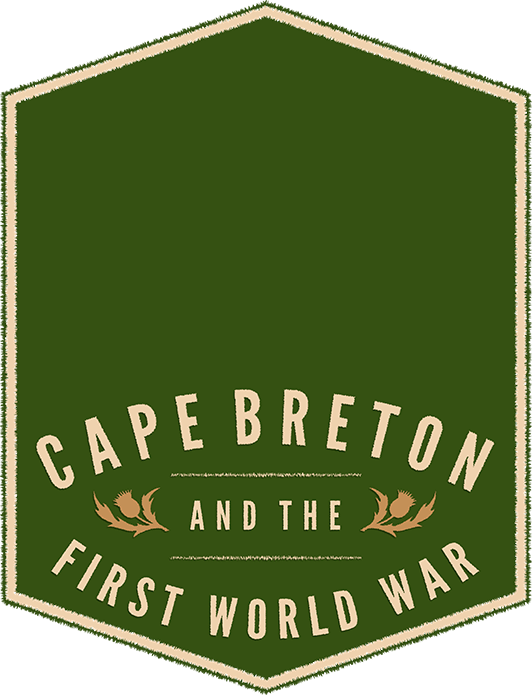This learning package has been developed to recognize the key roles played by four remarkable people from Cape Breton during the First World War. Their dedication and commitment to the war effort make them heroes in their own right, and set an example of patriotism and humanitarian relief during a time of crisis.
The Beaton Institute is the archive for Cape Breton University and a regional archive for Cape Breton Island. The Archive houses an extensive collection of primary or archival documents associated with these four individuals - photographs, interviews, recordings, newspaper clippings, correspondence, and more. Working with the Virtual Museum of Canada, the Beaton Institute has made these valuable resources available for use in classrooms in Nova Scotia and beyond through the exhibit, Cape Breton and the First World War. These collections, as well as service records from Library and Archives Canada, are at the core of these units.
Each of the individuals included in this exhibit played a significant role during the First World War, leaving family and friends behind to travel to their posts overseas. Coming from diverse backgrounds, they risked their own lives to restore peace, never forgetting their roots back at home and the loved ones who missed them dearly. Their strength and courage are remembered in this exhibit, and students will learn first-hand how their contributions were truly noteworthy while emblematic of the hundreds of thousands of Canadians who contributed to or gave their life during the war effort. Through a series of teaching and learning activities, the lives and stories of these four individuals will be explored and honoured:
-
Helen Kendall, Nursing Sister
- Women and the War
- Helen Kendall, Nursing Sister
- Life after the War
-
John Roderick McDougall, Tunneller
- The Life of a Coal Miner in Industrial Cape Breton
- John Roderick McDougall, Tunneller
- Life after the War
-
James Murphy, Lieutenant
- Growing Up in Margaree, Cape Breton
- Recruitment and the First World War
- Life after the War
-
Anthony Sumiejski, Prisoner of War
- Seeking a New Life in Canada
- Service in the Canadian Expeditionary Forces
- Prisoner of War
Each unit contains an introduction that sets the historical and curriculum context and suggestions for learning and teaching that connects to a wealth of primary documents from the Beaton Institute, Library and Archives Canada, and the web.
The Essential Graduation Competencies form a framework for all school curricula, no matter what the subject and level. This framework outlines the expectations that students will have attained when they graduate from high school and it describes, in very broad terms, what students should know, be able to do, and value when they finish Grade 12. These expectations centre on the following:
- Citizenship (including environmental, community, and social issues)
- Personal and career development
- Critical thinking
- Technological fluency
- Communication
- Creativity/innovation
Because all curricula must assist students in achieving these general graduation expectations, they can provide a helpful reference when considering links with the curriculum, whatever the subject and grade level.
Each of these expectations (Essential Graduation Competencies) provides rich opportunities for relevant links to investigating the lives of those whose profiles are included in this package. For example:
- Citizenship includes focus on social and cultural diversity and the role of communities.
- Communication includes listening, interacting, and understanding ideas and emotions presented in various forms.
- Critical thinking includes analysing and evaluating ideas and expressing ideas and emotions through multiple media.
- Creativity/innovation includes openness to new experiences, imagining, creating, innovating, valuing aesthetic expression, and appreciating the creative work of others.
This educational resource is designed primarily for students in middle school and high school. Teachers can select from the range of suggestions for learning and teaching with the understanding that adaptations may be made when required. The resource also provides an opportunity for self-directed learning in settings that encourage this type of knowledge acquisition. With all this in mind, it is hoped that teachers, particularly those teaching social studies and language arts, will find in these units a rich resource for planning learning activities for their students.
The selection of these four Cape Bretoners who made significant contributions to the First World War is not by accident. There were many notable men and women who served in the war but the lives of these four people – Helen Kendall, John Roderick McDougall, James Murphy, and Anthony Sumiejski – have an added dimension because friends, family, and others saw them, their work, and their contribution to society as important. They saved their letters, photographs, and keepsakes because they valued them. Over time, they understood that these documents had value for others and so they ensured that they were donated to institutions like the Beaton Institute, Library and Archives Canada, etc. to allow future generations to see these four as humans, not just names, who gave of themselves. These institutions have an important role to play in society. They are our memory.
Dr. Eric Favaro, Educational Consultant


